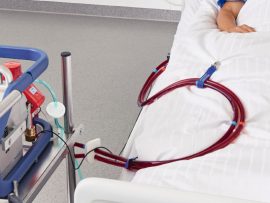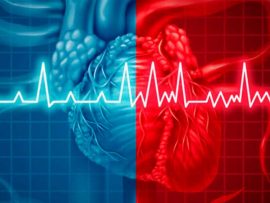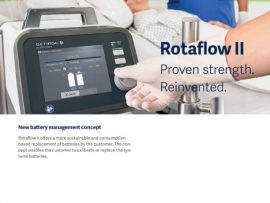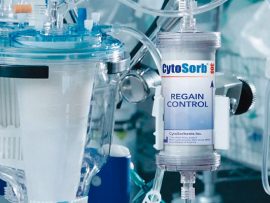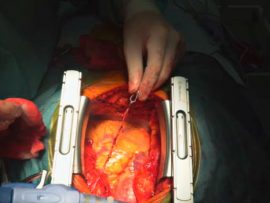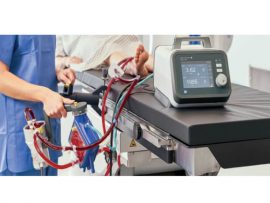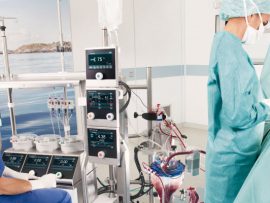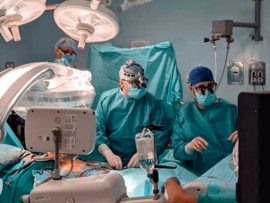Abstract Objectives The aim of this study was to quantify and understand the unloading effect of percutaneous balloon atrial septostomy (BAS) in acute (CS) treated with venoarterial (VA) membranous oxygenation (ECMO). Background..
Read MoreAbstract Venoarterial extracorporeal membrane oxygenation may be used for circulatory support in cardiogenic shock as a bridge to recovery, a bridge to a ventricular assist device (VAD), or a bridge..
Read MoreAbstract Cardiogenic shock is associated with high mortality. Patients often require temporary mechanical circulatory support. We aimed to develop a percutaneously implantable, assist device that unloads the left ventricle (LV)..
Read MoreAbstract Introduction Mechanical circulatory support (MCS) devices are increasingly used as a treatment option in resuscitation or in patients with cardiogenic shock (CS). Prophylactic implantation in high-risk percutaneous coronary interventions..
Read MoreAbstract Objective Venoarterial is a rescue therapy for patients in . We hypothesize that patients bridged to with extracorporeal membrane oxygenation have decreased survival. Methods The United Network of Organ Sharing database was..
Read MoreAbstract Aim Patients with cardiogenic shock or ARDS, for example, in COVID-19/SARS-CoV-2, may require extracorporeal membrane oxygenation (ECMO). An ECLS/ECMO model simulating challenging vascular anatomy is desirable for cannula insertion..
Read MoreAbstract Background: There has been increasing use of extracorporeal membrane oxygenation (ECMO) as bridge to heart transplant (orthotopic heart transplant [OHT]) or left ventricular assist device (LVAD) over the last..
Read MoreAbstract Introduction and objectives Lactate and its evolution are associated with the prognosis of patients in shock, although there is little evidence in those assisted with an extracorporeal venoarterial oxygenation..
Read MoreAbstract Background Age over 70 years seems to confer poor prognosis for patients under mechanical circulatory support (MCS). Advanced age is usually a relative contraindication. Our objective was to assess the..
Read MoreAbstract Stroke has potentially devastating consequences for patients receiving veno-arterial extracorporeal membrane support (VA-ECMO). Arterial cannulation sites for VA-ECMO include the ascending aorta, axillary artery, and femoral artery. However, the..
Read MoreAbstract Cardiogenic shock is an uncommon but serious complication of acute myocardial infarction. Temporary mechanical circulatory support devices are being used more often in this setting, and physicians are required..
Read MoreAbstract Drugs intoxications often lead to severe vasoplegia and cardiogenic shock, and VA-ECMO represents a viable therapy option. However, as cardiopulmonary support is not contributing to the removal of the..
Read MoreAbstract Background: Veno-arterial extracorporeal membrane oxygenation (VA-ECMO) is the rescue treatment proposed to patients with refractory cardiogenic shock. The VA-ECMO implantation promotes inflammation and ischemia-reperfusion injuries through the VA-ECMO flow, causing..
Read MoreAbstract Objective Current guidelines consider obesity to be a relative contraindication to veno-arterial extracorporeal membrane oxygenation (VA-ECMO) for refractory cardiogenic shock. The authors investigated the effect of body mass index..
Read MoreAbstract Introduction: Elevated left atrial pressures (LAP) are associated with worse outcomes among patients with cardiogenic shock (CS), yet there are limited data on the utility of continuous invasive monitoring of..
Read MoreAbstract Introduction The impact of Impella and ECMO (ECPELLA) in (CS) remains to be defined. The aim of this meta-analysis is to evaluate the benefit of ECPELLA compared to VA-ECMO in..
Read MoreAbstract Patients with coronavirus disease 2019 (COVID-19) can present with a large panel of cardiac manifestations, including myocardial infarction with (type 1) or without (type 2) obstructive coronary artery disease,..
Read MoreAbstract Aims Knowledge about the impact of epinephrine on the outcome in venoarterial (VA) extracorporeal membrane oxygenation (ECMO) patients is limited, and existing data are conflicting. Methods and results We..
Read MoreAbstract Background Single-center studies suggest that implementation of multidisciplinary (CS) teams is associated with improved CS survival. Objectives The aim was to characterize practice patterns and outcomes in the management of..
Read MoreAbstract Refractory cardiogenic shock (CS) often requires veno-arterial extracorporeal membrane oxygenation (VA-ECMO) to sustain end-organ perfusion. Current animal models result in heterogenous cardiac injury and frequent episodes of refractory ventricular..
Read MoreAbstract Introduction Cardiopulmonary bypass (CPB) is currently performed in infants and newborns for surgical correction of congenital heart diseases (CHDs).1 CPB exposes the body to extreme, nonphysiologic conditions that initiate a..
Read MoreHypoxic-ischemic brain injury is the main cause of death or disability in patients resuscitated from cardiac arrest (CA). Veno-arterial extracorporeal membrane oxygenation (VA ECMO) may be used as a mechanical support for..
Read MoreAbstract Dynamic or hybrid configurations for extracorporeal membrane oxygenation (ECMO) are needed when patient physiology or clinical conditions change. Dynamic configurations included configurations converting from veno-arterial (V-A) ECMO or veno-venous..
Read MoreAbstract Extracorporeal membrane oxygenation (ECMO) is a last resort therapy for patients with terminal respiratory failure. In the current worldwide surge of critically ill patients with novel coronavirus disease (COVID-19),..
Read MoreAbstract Introduction: The intra-aortic balloon pump (IABP) and Impella are left ventricular unloading devices with peripheral venoarterial extracorporeal membrane oxygenation (VA-ECMO) in place and later serve as bridging therapy when..
Read MoreAbstract EXTRACORPOREAL MEMBRANE OXYGENATION (ECMO) is a therapeutic modality used in patients with pulmonary, cardiac, or combined cardiopulmonary failure when other methods of organ support have failed. Venovenous (VV) ECMO..
Read MoreAbstract Veno-arterial extracorporeal membrane oxygenation (VA-ECMO) supports patients suffering from refractory cardiogenic shock. Thromboembolic complications (TeC) are common in VA-ECMO patients and are associated with increased morbidity and mortality. Valid..
Read MoreAbstract Background The usefulness of right heart catherization (RHC) has long been debated, and thus, we aimed to study the real‐world impact of the use of RHC in cardiogenic shock...
Read MoreAbstract Venoarterial extracorporeal membrane oxygenation (ECMO) is used in cardiogenic shock refractory to inotropic support and intra-aortic balloon pump (IABP) support. Peripheral ECMO can lead to ventricular distention, and IABP..
Read MoreAbstract Dynamic or hybrid configurations for extracorporeal membrane oxygenation (ECMO) are needed when patient physiology or clinical conditions change. Dynamic configurations included configurations converting from veno-arterial (V-A) ECMO or veno-venous..
Read More
